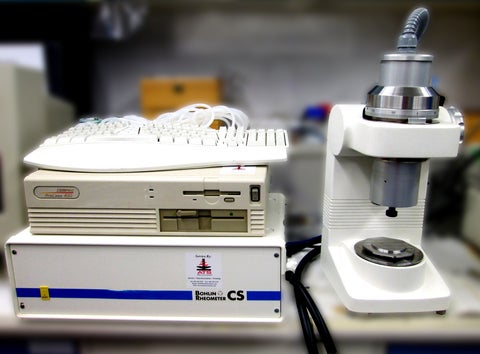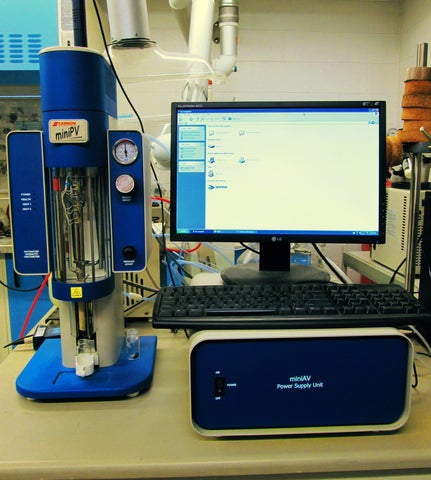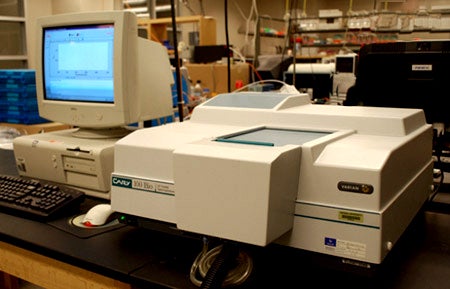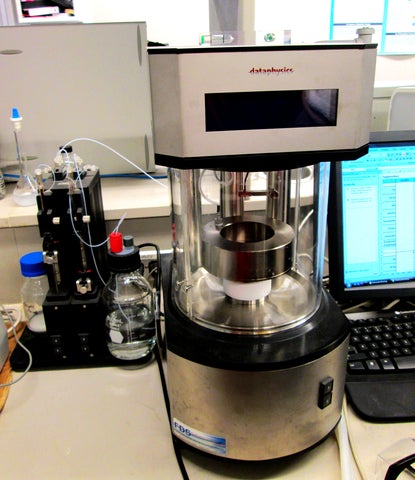
Laser light scattering System
The laser light scattering system is an essential equipment for the quantification of microstructure of self-assembled systems. The parameters determined from this instrument include hydrodynamic radius, radius of gyration, second virial coefficient, and molecular weights. These are basic information needed for the elucidation of the self-assembly process observed in amphiphilic polymeric systems.

Bohlin-CS Rheometer
Bohlin CS (Constant Stress) is a very advanced and accurate rheometer for measuring rheological properties in suspensions, for example cement paste or materials such as oils or admixtures. The rheometer is controlled by a PC and Windows software where it is possible to use different measuring programs such as creep, stress viscometry, oscillation, stress sweep, yield stress or constant rate viscometry. It is also possible to use such a called "job stream" to automatically run different measure programs with different set-ups after each other. Some of the output parameters used for evaluation are yield stress, viscosity, the degree of thixotropy, and the degree of structure in the materials tested. In the rheometer it is also possible to check the temperature between -30 to +130°C.

Thermo Scientific Heraeus Megafuge 11 Centrifuge
The Thermo Scientific Heraeus Megafuge 11 Centrifuge Series is an excellent choice for high-capacity, high-throughput processing in the lab. Offering outstanding reliability, the Heraeus Megafuge 11 Centrifuge Series delivers consistent separations quickly, with maximum convenience and comfort.

FreeZone 1 Liter Benchtop Freeze Dry System
FreeZone Freeze Dry Systems have collector temperatures that reach -50°C (-58°F), ideal for use with samples in aqueous solutions. The freeze dryers is equipped with a drying chamber or tray dryer for operation. It is connected to a vacuum pump for operation and is a convenient, nondestructive way of dehydrating biological samples, hydrogels, and nanoparticles which are sensitive to high temperatures.

miniPV® POLYMER SOLUTION Automatic Viscometer
The miniPV® from CANNON Instrument Company is an essential tool for the measurement of polymer solution viscosities. Its accuracy and convenience are based on the masterful design of temperature control, fluid handling, sensor technology, and automation.

Heidolph® LABOROTA Digital Rotatory Evaporators
A rotary evaporator is a device used for the efficient and gentle removal of solvents from samples by evaporation. Our LABOROTA Digital Rotary Evaporator with digital display and heating bath for water or oil (temperatures up to 180°C) is ideal for more complex distillations requiring insight into process parameters. The digital rotary evaporators have a standard digital display for rotation speed, vapor temperature and bath temperature.

Varian Cary 100 Bio UV–Visible Spectrophotometer
The Facility maintains a Varian Cary 100 Bio UV / Visible Spectrometer for standard data collection on biological samples. The dual-beam Czerny-Turner instrument has a wavelength range of 190–900 nm with a spectral bandwidth of 0.2 nm. It features a working range past 3.5 absorbance units, so dilution of samples to bring them into the instrument range is not necessary. This instrument is also equipped with a temperature controlled 6 x 6 multicell holder complete with built in stirring capabilities, allowing precise thermal control from -10°C to 100°C.

Potentiometric and Conductometric Titrator
As almost all the synthetic polymer systems to be developed consist of polyacids and polybases, this equipment is essential for the quantification of acid and basic content of the polymeric chains. The nature of the polymer-surfactant interactions can also be determined by measuring the conductance as a function of surfactant concentrations. Novel drug selective electrode systems will also be developed, and they can be incorporated with this system for the quantification of drug-polymer interactions.

Titration and Scanning Calorimetric Systems (ITC and mDSC)
Understanding of drug-polymer and surfactant-polymer interactions is critical in the development of suitable delivery vehicles for drug delivery systems. The thermodynamics of binding can be adequately quantified by ITC, where parameters, such as the equilibrium constant, Gibbs free energy, enthalpy, entropy, and the stiochiometry of binding can be determined. At the same time, the thermal transition of thermal responsive amphiphilic polymers and polymer-drug or polymer–surfactant systems can be determined using the microDSC.

Surface Tensiometer
The surface tensiometer is an instrument that measures the changes in surface tension when a surfactant or block copolymer is titrated to an aqueous solution. It can measure the interactions and the critical micellar concentration.

High Gradient Magnetic Separator (HGMS)
The HGMS is an essential component of the process equipment needed for research on magnetic nanoparticles. This equipment essentially captures magnetic nanoparticles after they have been exposed to proteins or other molecules to be captured.

Electro-Motive Force Measurement (EMF) System
The EMF system consists of a measuring drug membrane electrode (DME) and an Ag/AgCl reference electrode purchased from VWR. The electrochemical system arrangement is: Ag/AgBr/internal solution/membrane/test solution/Ag/AgCl reference electrode. The electrodes are attached to an ELIT 4-Channel Ion-Analyzer (ELIT 9804), and the electromotive force (EMF) is recorded by the Radiometer ABU93 Tri-burette titration system with a built in micro-voltmeter. The software used to acquire the data is ELIT 4-Channel Ion-Analyzer version 7.1.44sa.

Reactor Systems
The heart in the development and production of new and novel materials involves polymer chemistry, where the desired materials will be synthesized. Two complementary glassware scale reactor systems, each with different requirements will be established within the two fume hoods in a 700 sq.ft laboratory to be renovated in the Department of Chemical Engineering.